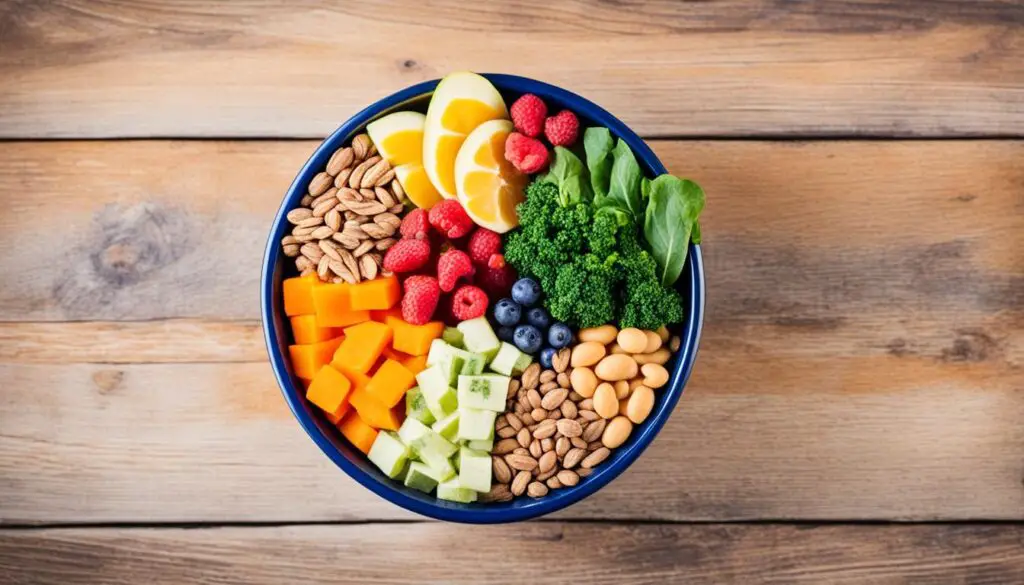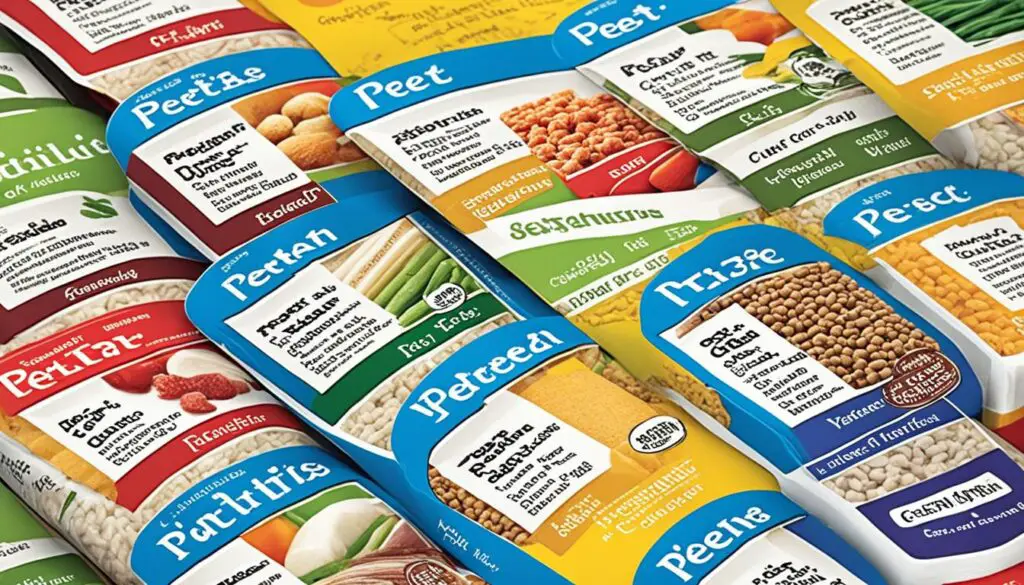As responsible dog parents, understanding our pets’ nutritional needs is key. We must ensure they lead an active, thriving life. By balancing their diet with exercise, we promote their well-being and joy.
Key Takeaways:
- Understanding the nutritional needs of your pet is crucial for their well-being.
- A balanced diet and regular exercise are key to ensuring a thriving pet.
- Providing optimal nutrition supports an active life for your dog.
- Consult with a veterinarian for tailored dietary recommendations.
- Choose high-quality pet food that meets your dog’s specific needs.
The Six Essential Nutrients Your Dog Needs
As responsible dog parents, we must ensure our furry friends get the right nutrients. They need a balanced diet filled with six essential nutrients. Let’s explore these nutrients and why they’re so important for your dog’s diet.
Water
Water is crucial for your dog. Dogs must have fresh, clean water at all times. It helps with digestion, keeps them cool, lubricates joints, and makes sure organs work well. Always make sure your dog can get to clean water to stay healthy.
Fat
Fat serves many purposes in your dog’s body. It provides energy, keeps their skin healthy, and their coat shiny. Fats also protect organs and help with hormone control. Choose dog food with good fats, like omega-3 and omega-6.
Protein
Protein is key for growth, tissue repair, and strong muscles in dogs. It also supports skin health and the immune system. Good protein sources include meat, fish, eggs, lentils, and chickpeas for dogs with special diets.
Carbohydrates
Carbohydrates give dogs the energy they need. They support physical activity and basic bodily functions. Dogs don’t need as many carbs as humans, but some, like whole grains and veggies, are good for them.
Vitamins
Vitamins support cell growth, the immune system, and metabolism. Dogs need fat-soluble vitamins (A, D, E, K) and water-soluble ones (B, C). A balanced diet with various fruits and veggies will provide these vitamins.
Minerals
Minerals help with bone growth, nerve function, and fluid balance. Important minerals include calcium, phosphorus, and potassium. It’s crucial to feed your dog a diet rich in these minerals.
Feeding your dog a diet with water, fat, protein, carbs, vitamins, and minerals supports their health. Check with your vet to make sure your dog gets what they need based on their unique health.
Providing the right nutrients is vital for your dog’s well-being. Knowing about these nutrients helps you choose the best for their diet. Keep their food and water bowls full, and they’ll thrive!
Understanding Guaranteed Analysis and Pet Food Labels
Choosing the right pet food for your dog is very important. You need to understand the information on the product label. This includes the guaranteed analysis and how to read pet food labels.
Decoding Guaranteed Analysis
Guaranteed analysis is required by law on pet food labels. It shows the minimum and maximum nutritional values of the food. These include protein, fat, fiber, and moisture.
- Protein: The minimum amount of protein present in the food.
- Fat: The minimum amount of fat present in the food.
- Fiber: The maximum amount of fiber present in the food.
- Moisture: The maximum amount of moisture present in the food.
It’s important to know these values. They help you see if the food meets your dog’s needs.
Deciphering Pet Food Labels
Pet food labels give details about the ingredients and food composition. Ingredients are listed by weight, starting with the main one.
“Decoding pet food labels is like solving a puzzle. By carefully reading the ingredient list, you can uncover what exactly goes into your pet’s food.”
When looking at the ingredients on the label, search for quality protein sources. These include real meat, fish, or poultry. Also, look for whole grains and veggies. Stay away from fillers, artificial additives, and by-products.
Learning to read pet food labels and the guaranteed analysis helps you make smart choices. You can pick a high-quality food that keeps your pet healthy and happy.
Expert Advice: Seek Professional Guidance
It’s a good idea to talk to a vet when choosing pet food for your dog. They can suggest the best food based on your dog’s breed, age, size, and health.
Conclusion
Feeding your dog the right food is very important for their health. Dogs need six key nutrients to be healthy. When you know what’s in their food and pick the best one, your dog will have a diet that keeps them active.
Talk to your vet about what your dog should eat. Every dog is different because of things like breed, age, and health. Your vet can help you choose the best food for your dog.
Making sure your dog eats well is a big part of being a pet owner. With the right food, your dog will be happy and full of life. Pick the best food for them and watch as they live a long and joyful life with you.
FAQ
What are the six essential nutrients that dogs need in their diet?
Dogs need six key nutrients to stay healthy. These include water, fat, protein, carbohydrates, vitamins, and minerals.
Why is water important for dogs?
Water keeps dogs hydrated and helps their bodies work right. It regulates their temperature, aids in digestion, and supports key functions.
What does fat do for dogs?
Fat safeguards a dog’s organs and provides energy. It also helps maintain the right body temperature. It’s vital for their health.
What does protein do for dogs?
Protein helps dogs build muscles and tissues. It’s needed for bone growth, hormone production, and making enzymes function.
Why are carbohydrates important for dogs?
Carbs give dogs energy for their daily activities. They supply glucose, crucial for brain work and physical performance.
What do vitamins and minerals do for dogs?
Vitamins and minerals boost a dog’s health in many ways. They keep the immune system strong, support healthy bones and teeth, and help cells work properly.
How can I understand the information on pet food labels?
The guaranteed analysis on labels shows protein and fat content, plus fiber and moisture limits. The ingredient list reveals what’s in the food, starting with the main one.
What should I look for in a pet food ingredient list?
Look for pet foods with specific protein sources like chicken, beef, or fish. Avoid vague terms like “meat by-products” or “animal digest.”
How can I choose the right dog food for my pet?
Consider your dog’s breed, age, and health when picking food. Talk to your vet for tailored dietary advice.
Why is providing optimal nutrition important for my dog?
Good nutrition is key for your dog’s health and happiness. It supports an active life and leads to a long, healthy life.



